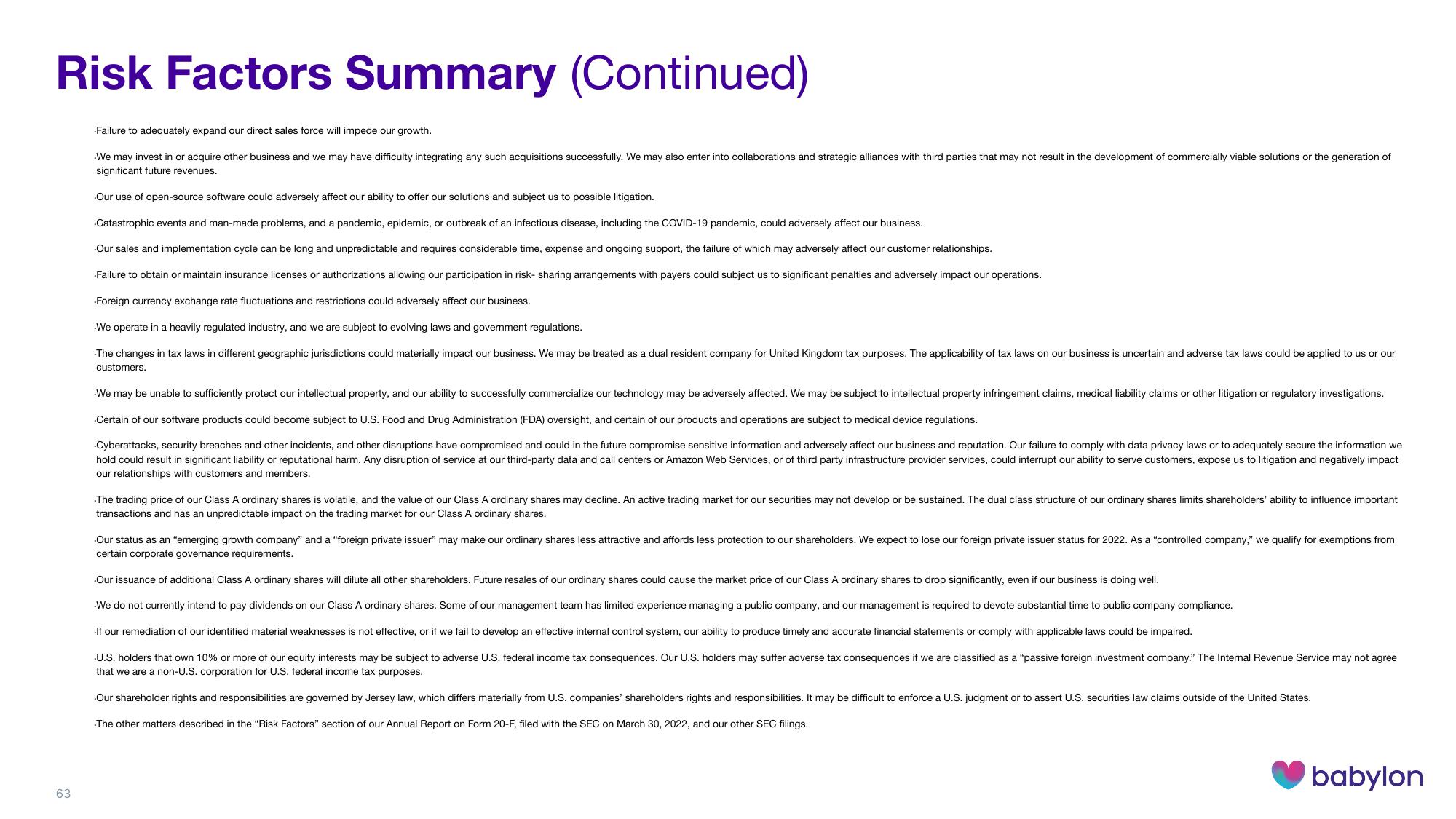Babylon Investor Day Presentation Deck
Risk Factors Summary (Continued)
63
-Failure to adequately expand our direct sales force will impede our growth.
.We may invest in or acquire other business and we may have difficulty integrating any such acquisitions successfully. We may also enter into collaborations and strategic alliances with third parties that may not result in the development of commercially viable solutions or the generation of
significant future revenues.
Our use of open-source software could adversely affect our ability to offer our solutions and subject us to possible litigation.
Catastrophic events and man-made problems, and a pandemic, epidemic, or outbreak of an infectious disease, including the COVID-19 pandemic, could adversely affect our business.
.Our sales and implementation cycle can be long and unpredictable and requires considerable time, expense and ongoing support, the failure of which may adversely affect our customer relationships.
-Failure to obtain or maintain insurance licenses or authorizations allowing our participation in risk- sharing arrangements with payers could subject us to significant penalties and adversely impact our operations.
-Foreign currency exchange rate fluctuations and restrictions could adversely affect our business.
.We operate in a heavily regulated industry, and we are subject to evolving laws and government regulations.
The changes in tax laws in different geographic jurisdictions could materially impact our business. We may be treated as a dual resident company for United Kingdom tax purposes. The applicability of tax laws on our business is uncertain and adverse tax laws could be applied to us or our
customers.
.We may be unable to sufficiently protect our intellectual property, and our ability to successfully commercialize our technology may be adversely affected. We may be subject to intellectual property infringement claims, medical liability claims or other litigation or regulatory investigations.
Certain of our software products could become subject to U.S. Food and Drug Administration (FDA) oversight, and certain of our products and operations are subject to medical device regulations.
-Cyberattacks, security breaches and other incidents, and other disruptions have compromised and could in the future compromise sensitive information and adversely affect our business and reputation. Our failure to comply with data privacy laws or to adequately secure the information we
hold could result in significant liability or reputational harm. Any disruption of service at our third-party data and call centers or Amazon Web Services, or of third party infrastructure provider services, could interrupt our ability to serve customers, expose us to litigation and negatively impact
our relationships with customers and members.
The trading price of our Class A ordinary shares is volatile, and the value of our Class A ordinary shares may decline. An active trading market for our securities may not develop or be sustained. The dual class structure of our ordinary shares limits shareholders' ability to influence important
transactions and has an unpredictable impact on the trading market for our Class A ordinary shares.
Our status as an "emerging growth company" and a "foreign private issuer" may make our ordinary shares less attractive and affords less protection to our shareholders. We expect to lose our foreign private issuer status for 2022. As a "controlled company," we qualify for exemptions from
certain corporate governance requirements.
Our issuance of additional Class A ordinary shares will dilute all other shareholders. Future resales of our ordinary shares could cause the market price of our Class A ordinary shares to drop significantly, even if our business is doing well.
.We do not currently intend to pay dividends on our Class A ordinary shares. Some of our management team has limited experience managing a public company, and our management is required to devote substantial time to public company compliance.
If our remediation of our identified material weaknesses is not effective, or if we fail to develop an effective internal control system, our ability to produce timely and accurate financial statements or comply with applicable laws could be impaired.
.U.S. holders that own 10% or more of our equity interests may be subject to adverse U.S. federal income tax consequences. Our U.S. holders may suffer adverse tax consequences if we are classified as a "passive foreign investment company." The Internal Revenue Service may not agree
that we are non-U.S. corporation for U.S. federal income tax purposes.
Our shareholder rights and responsibilities are governed by Jersey law, which differs materially from U.S. companies' shareholders rights and responsibilities. It may be difficult to enforce a U.S. judgment or to assert U.S. securities law claims outside of the United States.
The other matters described in the "Risk Factors" section of our Annual Report on Form 20-F, filed with the SEC on March 30, 2022, and our other SEC filings.
babylonView entire presentation